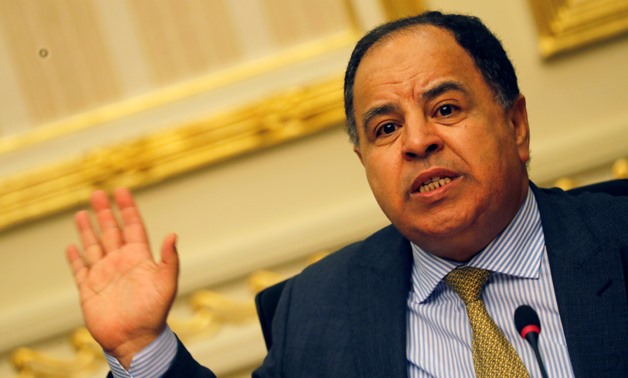
FILE PHOTO: Egypt's Finance Minister Mohamed Maait gestures during a news conference in Cairo, Egypt July 17, 2019. REUTERS/Amr Abdallah Dalsh/File Photo
CAIRO – 1 November 2021: Egypt aims to raise the private sector's contributions to economic activity to 50 percent within three years, according to Minister of Finance Mohamed Maait.
Maait stressed in a statement Monday that the "taxes digitization" projects are a successful model for partnership with the private sector, as the national project to modernize and mechanize the tax system, with its various tributaries, is being implemented in cooperation with major international companies operating in Egypt.
The Egyptian minister pointed out that the system aims to localize international expertise and the latest technological systems, in a manner consistent with the government’s efforts to open broad horizons to stimulate the business climate and maximize investment opportunities; given the private sector is the main driver of job-rich growth.
“This helps in strengthening the macroeconomic structure,” he commented.
Maait stated that Egypt was one of the first countries in Africa and the Middle East to implement the electronic invoice system in cooperation with Ernst & Young and Microsoft, in addition to e-Finance, and e-Tax and ITIDA, in a way that prompted us to complete the process of digitizing the economy by proceeding with the implementation of the electronic delivery system in cooperation with these companies, which were launched in beta last September.
He stated that it is scheduled to actually start implementing it in places of sale to consumers within 6.5 months; To enhance the governance of the tax system, through the optimal use of technological solutions in the real-time follow-up of commercial transactions between financiers and consumers in all sales and purchase outlets.
"The services will be provided throughout the republic, after we also succeeded in implementing the electronic declaration system with Excel Company, and then the automated system of unified tax procedures with the companies Ernst & Young, IBM, and SAP, in addition to E-Finance, within the framework of the national project to develop and automate the tax system, which aims to maximize opportunities for integrating the informal economy into the formal economy, in order to achieve tax justice, collect public treasury dues, and make it easier for financiers.
He stressed that the system contributes to stimulating investment, and is consistent with efforts to strengthen the financial governance of the state and ensure optimal use of its resources, in a way that helps achieve economic goals, meet the development needs of citizens, enhance spending to improve their lives, and improve the services provided to them.
Maait pointed out that the electronic invoice platform is considered a new crossing to "Digital Egypt", and is based on the establishment of a central electronic system to receive, review, approve and follow up sales and purchase invoices for commercial transactions between companies through the instantaneous exchange of invoice data in a digital format without relying on paper transactions to limit tax community.
Comments
Leave a Comment